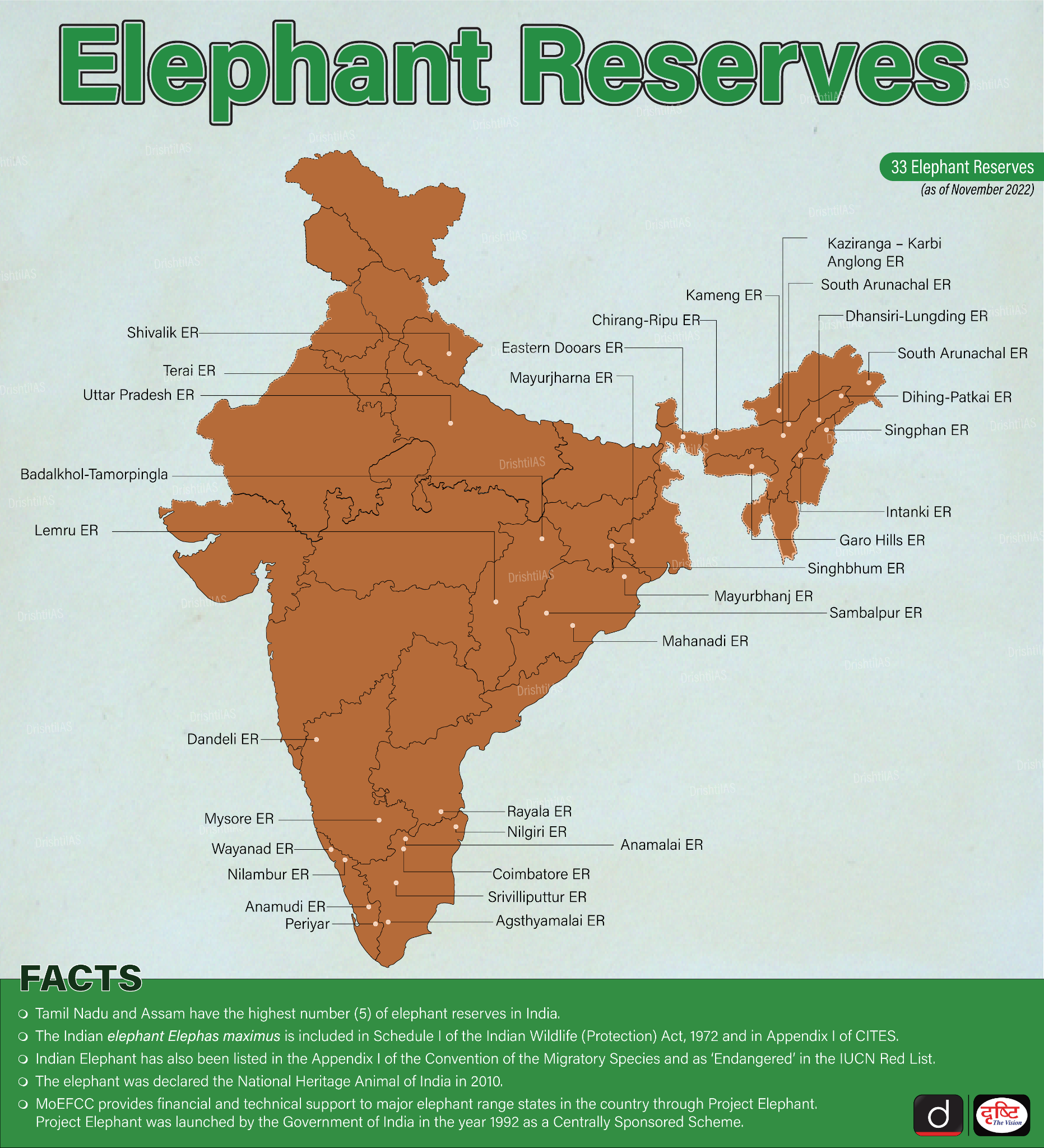Biodiversity & Environment
Elephant Corridors
- 23 Sep 2023
- 4 min read
For Prelims: Elephant corridors, Project Elephant, World Elephant Day
For Mains: Significance of elephant corridors in wildlife conservation, Initiatives related to elephant conservation.
Why in News?
Recently, the Indian government identified 62 new elephant corridors, marking a significant milestone in the nation's commitment to wildlife conservation. This brings the total number of such corridors to 150, a remarkable increase from the 88 registered in 2010.
What are the Key Highlights About Elephant Corridors?
- About:
- Elephant corridors can be described as a strip of land that enables elephant movement between two or more friendly habitats.
- The corridors were reported by respective state governments and ground validation methods were used to verify them.
- State Wise Distribution:
- According to the report, West Bengal leads with 26 corridors, constituting 17% of the total.
- East central India contributes 35% (52 corridors), while the North East region has 32% (48 corridors).
- Southern India has 21% (32 corridors), and northern India has the lowest with 12% (18 corridors).
- Status of Corridor Use:
- Elephant corridor report released by the central government showed a 40% increase in elephant corridors across 15 elephant range states in India.
- 19% of corridors (29) show a decrease in use, and 10 require restoration due to impairment.
- Decreased use is attributed to habitat fragmentation and destruction.
- Reasons for Increase in Corridors:
- Elephants have expanded their ranges in the Vidarbha region of Maharashtra and southern Maharashtra bordering Karnataka.
- Elephant corridors have increased in these areas.
- Elephants have also been seen in increased numbers in Madhya Pradesh and northern Andhra Pradesh.
- Elephants have expanded their ranges in the Vidarbha region of Maharashtra and southern Maharashtra bordering Karnataka.
Elephants
- Elephants in India:
- Elephants are keystone species as well as the Natural Heritage Animal of India.
- India has the largest number of wild Asian Elephants. The elephant population in the country is estimated to be over 30,000.
- Karnataka has the highest elephant population in India.
- Conservation Status:
- Convention of the Migratory Species (CMS): Appendix I
- Wildlife (Protection) Act, 1972: Schedule I
- International Union for Conservation of Nature (IUCN) Red List of threatened species:
- Asian Elephant: Endangered
- African Forest Elephant: Critically Endangered
- African Savanna Elephant: Endangered
- Conservative Efforts:
UPSC Civil Services Examination Previous Year Question (PYQ)
Prelims
Q. With reference to Indian elephants, consider the following statements: (2020)
- The leader of an elephant group is a female.
- The maximum gestation period can be 22 months.
- An elephant can normally go on calving till the age of 40 years only.
- Among the States in India, the highest elephant population is in Kerala.
Which of the statements given above is/are correct?
(a) 1 and 2 only
(b) 2 and 4 only
(c) 3 only
(d) 1, 3 and 4 only
Ans: (a)
Exp:
- The elephant herd is led by the oldest and largest female member (known as the matriarch). This herd includes the daughters of the matriarch and their offspring. Hence, statement 1 is correct.
- Elephants have the longest-known gestational (pregnancy) period of all mammals, lasting up to 680 days (22 months). Hence, statement 2 is correct. Females between 14 - 45 years may give birth to calves approximately every four years with the mean interbirth intervals increasing to five years by age 52 and six years by age 60. Hence, statement 3 is not correct.
- As per the Elephant Census (2017), Karnataka has the highest number of elephants (6,049), followed by Assam (5,719) and Kerala (3,054). Hence, statement 4 is not correct.
- Therefore, option (a) is the correct answer.





